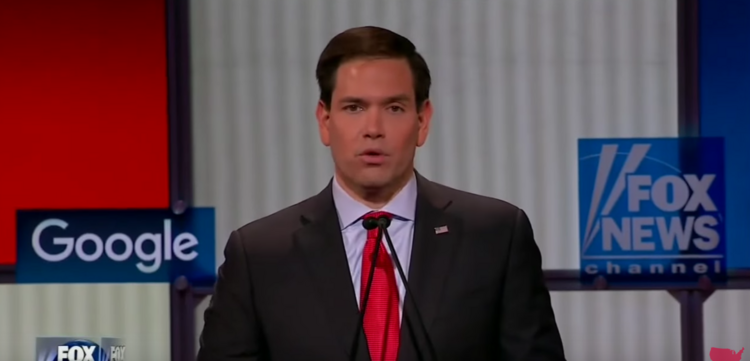If there are three lanes to the Republican nomination—one for religious conservative candidates, one for “establishment” candidates and one for Donald Trump—there’s also a concrete barrier in the establishment lane, between the apocalyptics (Marco Rubio, Chris Christie) and those who think the sun will continue to rise even if the GOP loses the next election (Jeb Bush, John Kasich). This division among the four candidates trying to become the alternative to Mr. Trump and Ted Cruz was particularly noticeable in last night’s debate, which Donald Trump boycotted.
Mr. Bush and Mr. Kasich argued that the glass is half-full in America; Mr. Rubio and Mr. Christie said that the glass has shattered in a thousand pieces, which Barack Obama and Hillary Clinton are personally stabbing into our eyes.
Marco Rubio can’t be accused of taking lightly any of the fears expressed by Republican voters, and he’s now staking his campaign on the premise that Americans see President Obama as a dangerous fool. In a campaign ad running in Iowa, he says, “After seven long years of this president, we feel our country slipping away.… I’m asking for your vote so we can leave our children what our parents left us: the single greatest nation in all mankind.”
His statements from the debate (see transcript here) include: “This campaign is about the greatest country in the world and a president who has systematically destroyed many of the things that made America special…. If I’m our nominee, I will unite this party and we’ll defeat Hillary Clinton and we will turn this country around once and for all, after seven years of the disaster that is Barack Obama…. Only with a strong America will we defeat this radical group, this apocalyptic group called ISIS…. When I'm president, unlike Barack Obama, we will keep this country safe.”
He called ISIS “the most dangerous jihadist group in the history of mankind” and said, “They want to trigger an apocalyptic Armageddon showdown.” Mr. Rubio raised the specter of a President Hillary Clinton appointing Mr. Obama to the Supreme Court (“That would be a disaster for this country”) and used his closing statement to remind his audience of the grievous mistake the American electorate made in 2008: “The Bible commands us to let our light shine on the world. For over 200 years, America’s light has been shining on the world and the world has never been the same again. But now, that light is dimming a little, after seven years of Barack Obama.”
Chris Christie painted a picture of a nation plunging into lawlessness under Obama: “Here’s the problem in this country right now. The problem is that Barack Obama has made law enforcement the enemy, Hillary Clinton has made law enforcement the enemy.” Mr. Christie implied that criticism of the police—in the wake of several high-profile shootings of unarmed civilians)—somehow makes Americans afraid of the police and less vigilant about possible terrorists (“It’s making people in neighborhoods nervous to go to law enforcement.”), but I can’t work the logic of that out.
Mr. Christie also played the Sept. 11 card, remembering, “On September 11, my wife was two blocks from the World Trade Center…and I had to confront the possibility of being a single parent.” From this experience, he concluded, “We need a commander-in-chief who not only understands how to protect us, but feels in here what it means to face the possibility of loss.” Mr. Christie seemed to be saying that his experience on Sept. 11 would make him uniquely angry about future terrorist attacks. Is that good?
In contrast to Marco Rubio and Christ Christie, John Kasich called himself an “optimist.” Speaking of the threat from ISIS, he said, “We have a unique time in America to connect with people all around the world that understand that there’s an existential threat against all of them, the Arabs, the Jordanians, the Saudis, the Egyptians, our friends in Europe, including the Turks. So we have a unique opportunity to bring everybody together. I saw Reagan do it, I’ve seen other presidents do it…. We’re going to be just fine and America is going to continue to lead the world.”
In his closing statement, Mr. Kasich continued the “don’t panic” theme: “We can, in fact, create jobs and provide job security. We can create a situation where wages begin to rise…. We can re-assume our role in the world. But all of this has to come together when we have a positive attitude, an optimistic approach, an ability for us to set the tune as conservatives, to invite other people in to be part of that orchestra.”
Jeb Bush, looking more relaxed without Mr. Trump onstage (and describing Marco Rubio as having “cut and run” on immigration reform, a description that could stick), tried to steer his party away from hostility toward immigrants and from the demonization of political opponents, saying, “We should be a welcoming nation. Our identity is not based on race or ethnicity, it’s based on a set of shared values…. You can deal with the threat of terror and also recognize that this country should be aspirational across the board…. We’re never going to win elections if we don’t have a broader unifying message.”
Marco Rubio’s potential to deliver a unifying message was once seen as his greatest strength, but he has been racing to the apocalyptic side of the stage since first Donald Trump and then Ted Cruz rose in the polls with doomsday rhetoric. We’ll see whether voters in Iowa and New Hampshire validate that move.








